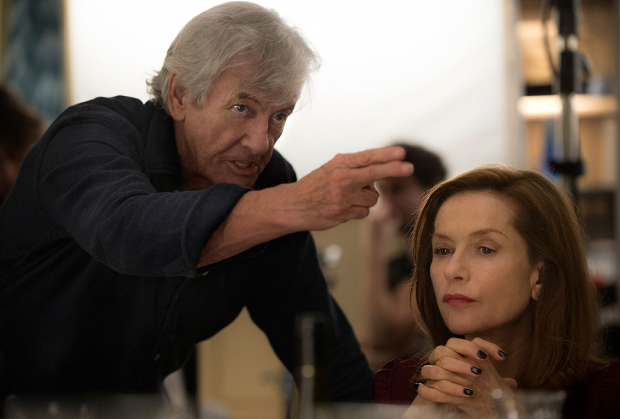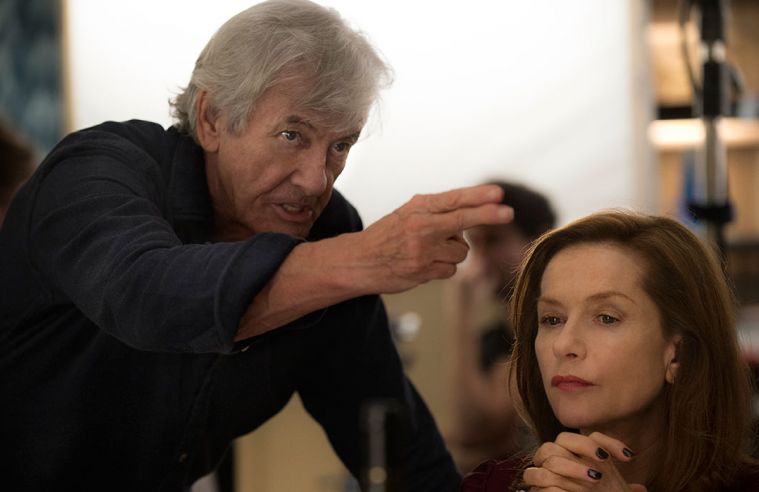
Likely to launch a thousand angered think-pieces, Elle is the latest film (and first French production) from master director Paul Verhoeven. Led by Isabelle Huppert in possibly one of her very best performances (read our interview with her here), it’s bracingly politically incorrect but undeniably refreshing in a time of watered-down multiplex entertainments. Since this writer’s been an immense fan of Verhoeven since near the dawn of his cinephilia, the opportunity to speak with him, if all too briefly, was an extreme honor. Highlighted by the fact that our interview took place the day after an American election result that seemed like something out of one of his films, there was the sense that the fire still burned for the 78-year-old classicist provocateur.
The Film Stage: It’s very well known that there was a failed attempt to make Elle in America. That opens up the question, what do you think of Hollywood cinema at the moment and do you miss working in the studio system?
Paul Verhoeven: The fact is, I wanted to do this French novel and ultimately translate it into English. I found an American scriptwriter to who I made clear I would like to work in the United States, though I had been developing in Europe lately. This was a project that I really thought was interesting and perhaps more interesting if it would be made for a much bigger audience: the American people. I tried very hard, and that was really our plan; Saïd Ben Saïd, our producer, said we would make an American movie with an American crew and American actresses.
I would say, in the last couple years, I was really disappointed with American filmmaking, because it was so hard for me to find projects that were interesting. There were always things in the direction of movies I’d already made, like the special-effects movies, sci-fi movies, and perhaps some thriller stuff that was offered to me, but there was nothing in the last ten years — with a few exceptions, but they didn’t go forward. So that’s why in 2005 / 2006 I went to Europe to make Black Book. And then there was trying for another nine, ten years in the United States to find something that I liked, that I really wanted to do, that I felt was worth doing, and spend one-and-a-half, two years of your life on. I couldn’t find it, but then I thought this project, Elle, would give me a chance to start again in American cinema, but we failed because we couldn’t find any American actresses that wanted to do this part.
So, yes: there is a problem in American filmmaking. Perhaps not in a financial way, because there are lots of movies that are doing extremely well in the United States. But it was difficult for me to find something that I hadn’t done before; something original, something that nobody else had done before. Nobody has really done anything in the direction of RoboCop or like Fritz Lang with Metropolis, and that was a hundred years ago.
I think it’s appropriate this film was ultimately made in France, considering the French are who’ve really come to appreciate you critically. Just look at the fact that Showgirls is getting a re-release there.
Showgirls was appreciated from the very beginning, certainly in the direction of the Cahiers du Cinéma. Also in general, I think Showgirls is seen in France as a very interesting movie — I mean, perhaps not the masterpiece that they sometimes say it is, but it was certainly a movie that was trying to say something, and, of course, that was not so much seen in the United States. In France, maybe it was because it was not their culture — it was Vegas culture — that they were more open-minded to see cynical, dark, and pessimistic tone that the movie has, so that they could accept it better. That’s possible. In the United States, it might have felt a little bit like an attack.

I think you were the first ever director to show up to the Golden Raspberry Awards to collect your prizes?
I think so, yeah. I felt that it would be an interesting experience. I mean, at the beginning, it was pretty horrifying — I came in and they were basically all making cat-calls and all other sounds while screening parts of the movie. But, ultimately, it turned out to be a great evening. They appreciated the fact that I had come, to walk seven or eight times forward to accept Razzies. I walked forward every time. Interestingly enough, it’s a clay model and they had only one, so I had to get it and bring it back to them. So Worst Director, Worst Film, Worst Music, Worst Script. So I went forward every time, and the more I walked forward the more enthusiastic people got because it was such a great evening.
Back to Elle: everyone is justifiably talking about how fantastic Isabelle Huppert is in the film, but how did you go about casting its very impressive ensemble cast?
Before I was part of this project, Isabelle Huppert had already read the French novel and had been contacting the writer of the book, as well the producer that had optioned the rights, Saïd Ben Saïd. This was two or three months before I had gotten the book, and she had expressed a very strong interest in doing this movie. Only Saïd and I met together, and Saïd had been working with Polanski, De Palma, Cronenberg, and Walter Hill lately. And I basically wanted to make this an American movie and we wouldn’t use a French cast. But the moment that we realized that we weren’t getting anywhere in the United States — certainly not financially, but also artistically with someone for the main part — we went back to France and immediately contacted Isabelle Huppert, who we knew, from the beginning, had wanted to do the project. I had even spoken to her during that time at the festival in Berlin, but at that time we were still thinking it would be American.
Isabelle Huppert was clear from the beginning, and because Isabelle Huppert was there — and as one of the two or three most important actresses in France — it attracted, immediately, all kinds actors and actresses of high level; they all wanted to work with her. So I think what we got out of Isabelle was not only a wonderful performance, but we also got an interest and eagerness of top French actors and actresses to participate. When we started the auditions knowing Isabelle would be the protagonist, all these people that were brought forward by the French casting director were willing to meet in my office just to do a scene. I mean, there was never any hesitation when I said, “Could you read that scene for me” so I could judge how they would do that. Anybody who said they don’t do that… well, they all did it, like Laurent Lafitte or Anne Consigny. All very important French actors and actresses, they were so objected by the project, but so certain by the presence of Isabelle Huppert. It functioned both ways.

I don’t know if this was intentional on your part, but the casting of Christian Berkel…
That was also influenced by the fact that it was a co-production. But of course we worked with Christian for Black Book previously and he’s one of the three German actors. It was a natural thing, knowing that Christian Berkel fluently spoke French.
I just thought his casting was interesting, I don’t know if it was intentional on your part, but he has a very strong resemblance to the director Otto Preminger, who Huppert had worked with before when she was very a young actress, and she was vocal about his tyrannical ways.
I think that’s a coincidence. [Laughs] I know, yeah. Sure. But that was really me not thinking about that so much as me thinking I needed a German actor for co-production purposes. But I hadn’t really started to audition anybody, and I knew Christian Berkel. I think he’s a great actor and it was an immediate choice.
In the interview with Cinema Scope, you mentioned how your daughter gave a little bit of input into the film…
I mean, yeah, she was. In the book, she was the CEO of a company that supervised the writing of scripts for television and film. I felt that was very abstract and, for a movie, ten people sitting at a table and talking about scripts you don’t know about and dramaturgical rules, was fine for the book but not very visual. But when I put that on the table when we had a family dinner, my youngest daughter who is a painter, said to me, “Why don’t you make her the CEO of a video game company?” Then it turned out David Birke who is the author of the script, knew everything about video games, I didn’t know so much about it. But when I brought the idea to him he was immediately, “Yeah, sure, I know everything about video games. I play them all the time. They’re one of my favorite things in life. The lingo, the way people talk, I know how it’s done and let’s do that.”
I’m curious about your newspaper column that you had in Holland where you wrote about film. Was that an effort to make cinema still seem culturally relevant, or was it just for your own interests?
That was really me expressing my respect and love for movies that had influenced me in some way or had admired without copying any of, because I had studied the way they worked. But mostly it would be interesting for two years to do because, mostly nowadays, film reviews are negative and negative news and things that explode and whatever. To have a full page every week of admiration and respect of other people. That’s to think like a democrat, I think [laughs] but that’s what I thought was interesting: to only bring in admiration every week, a space of love and respect for colleagues.

Elle is now in limited release and expanding.

